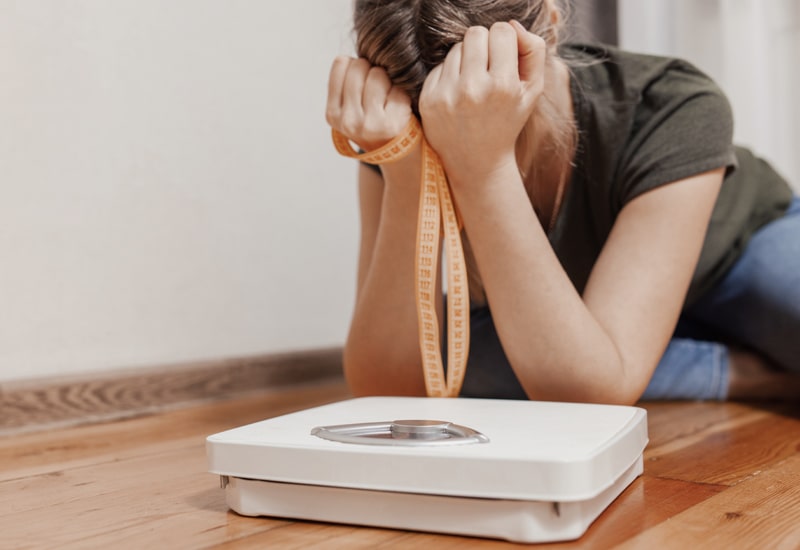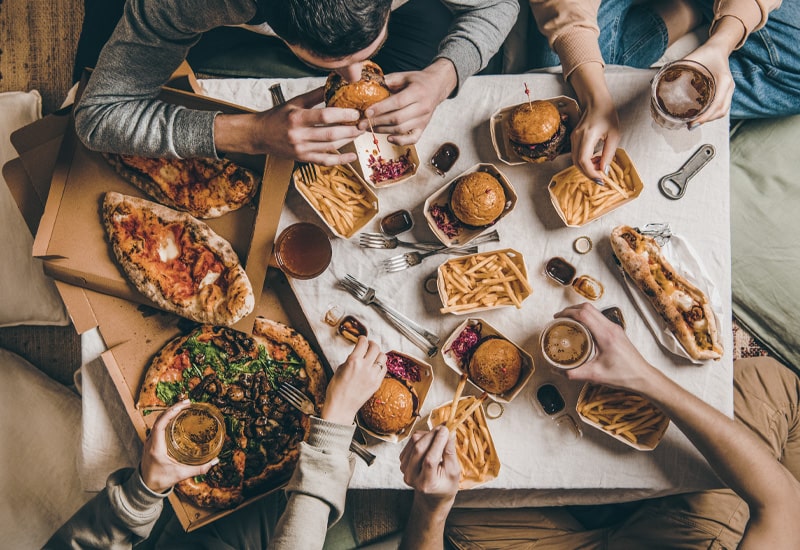When you start a food journey aimed at weight loss, you often tend to seek continuous confirmation on the progress of the journey, frequently using the scale to check the kg lost. The same also happens after particularly large meals: we weigh ourselves to be sure that that extra pizza (or Christmas Eve dinner!) hasn't affected the annoying little number too much.
Nothing could be more wrong: let's find out together why weighing yourself every day is not useful and indeed, can often be counterproductive.
GET OFF THE SCALE!
We'll tell you right away: weighing yourself every day is really useless. It can be demoralizing and also the weight can vary even during the day; thus, it is easy to misinterpret the measurement.

Even after a large meal, weighing yourself is not a good idea. Although we can think of "controlling" the situation in this way, by checking how many kg we have gained, the result we will have is not entirely true. But why? When we eat more than usual, such as at Christmas, during a party or a dinner out with friends, the foods we choose are different from those we usually consume. This causes our body to retain more liquids : when we step on the scale, the variation of 1 or 2 kg after the meal may in fact depend on what we have eaten occasionally, and a large part of this increase will simply be due to water and water retention.
Often, in fact, we happen to "binge" on very elaborate, salty, or particularly greasy foods (such as tasty traditional dishes): foods with these compositions can make the body inevitably retain liquids, liquids that in two-three the following days will settle down, making us return to our usual weight without too much effort and above all without skipping meals.
Obviously if we eat systematically exceeding our needs (and for a long time!) the situation changes: in that case the weight gain can be due to the increase in fat mass, an increase that is not scientifically possible when we exceed meal only.
What is the balance for?
The answer is very simple: it is a tool for measuring the weight of a body, or more precisely, its mass (but in this case we are not talking about fat or lean mass!). The scale is very important in a diet, because it serves more than anything to become aware of the path taken and the results that are slowly achieved. But, as already pointed out above, it makes no sense to weigh yourself every day. In order to have useful and truthful indications on our weight loss, we must in fact weigh ourselves at reasonable intervals of time. The obsession with weight can in fact generate anxiety and nervousness, feelings that are certainly not beneficial to those who are working to lose weight. Weight also undergoes physiological variations and oscillations during the day and from one day to the next, due to the amount of water present in the body or even to intestinal function.
Furthermore, healthy and lasting weight loss takes place in weeks, not in a few days . The same thing obviously also applies to the kg gained: you don't get fat just with a cheat meal or cheat day . It is therefore not worth weighing yourself after a large meal and feeling demoralized by the increasing kg, because it is not "real fat".
When is it best to weigh yourself?
The most correct and functional way to weigh yourself, both for weight loss and for maintenance, is to choose a fixed day and time per week and repeat the measurement always and only at that moment, always weighing yourself on the same scale, so as to avoid oscillations due to the instrument. Always keeping the same time is also a good habit, because it allows you to maintain the same physiological conditions (for example, did you know that we always weigh more in the evening?). It is therefore indifferent to weigh yourself in the morning or in the evening, as long as the time is always the same, so that the results are actually comparable. Indeed, it might be advisable to weigh yourself no more than once every 15 days, to see even more reliable variations.
Why do I weigh more?
There are many reasons that can affect weight fluctuations and the increase of the number on the scale. Between these:
- The amount of water in the body: as already mentioned, the balance between the water contained in our body and the amount of sodium ingested (depending on the type of food consumed) can greatly influence our body weight, which can increase up to to 2 kg due to water retention.
- The contents in the intestine: if we weigh ourselves after a meal, our weight will certainly have increased. This clearly depends on the amount of food we have ingested and which remains in our intestines.

- Muscle glycogen: Glycogen is the "reserve" of carbohydrates that we can store in the muscle and liver. When we train at high intensity this quantity can decrease, giving rise to a fictitious weight loss, which will be restored when we re-introduce carbohydrates.
What did we learn…
Drop the balance. Leave it aside especially after convivial occasions and after large meals: seeing that extra kg will not help you psychologically and moreover it will not give you any useful information on your weight loss. Fat mass does not increase in relation to a single meal, and as we have seen there are many variables that can influence weight gain (not real). So try not to get demotivated and find your balance. Establish the most suitable moment for you to weigh yourself (if you deem it necessary) and try to be patient: the results will come, we are sure of it.
Bibliography
Aragon AA, Schoenfeld BJ, Wildman R, Kleiner S, VanDusseldorp T, Taylor L, Earnest CP, Arciero PJ, Wilborn C, Kalman DS, Stout JR, Willoughby DS, Campbell B, Arent SM, Bannock L, Smith-Ryan AE, Antonio J. International society of sports nutrition position stand: diets and body composition. J Int Soc Sports Nutr. 2017 Jun 14;14:16. doi: 10.1186/s12970-017-0174-y. PMID: 28630601; PMCID: PMC5470183.
Popkin BM, D'Anci KE, Rosenberg IH. Water, hydration, and health. Nutr Rev. 2010 Aug;68(8):439-58. doi: 10.1111/j.1753-4887.2010.00304.x. PMID: 20646222; PMCID: PMC2908954.
https://www.crea.gov.it/web/alimenti-e-nutrizione/-/linee-guida-per-una-sana-alimentazione-2018
Mariani Costantini A., Cannella C., Tomassi G., (2016), Food and human nutrition , Il Pensiero Scientifico Editore.
